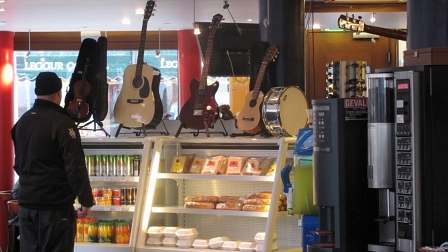Erstellt am: 6. 4. 2010 - 20:21 Uhr
So much for the South

Johnny Bliss, 2010
In Iceland, you sort of get used to being sidetracked. You make plans to go somewhere and then this giant storm comes, and BOOM! you end up somewhere else. That's the way it is. Planning ahead is almost considered naive. It was nearly silly of me to think I would ever actually make it to the Aldrei fór ég suður/Never Went South festival at all. But I did.
Even getting to Ísafjörður where this festival was being held was so much more of a task than I had signed up for. Aside from nearly driving off a cliff by an icy road several times, we spent most of the time on our way driving very slowly through various shades of the colour white.

Johnny Bliss, 2010

Johnny Bliss, 2010
And then we got there: the small fishing village hosting the Northern most music festival in the entire world. Despite having only 4000 residents and a declining fish-based economy, it manages to still have a lively downtown area which stands out from the suburbs.

Johnny Bliss, 2010

Johnny Bliss, 2010
I met a local who introduced himself as William, and I asked him what kind of impact he thought the Never Went South Festival had on the region.
"It is the biggest settlement in the West Fjords, but it's not really big. It's mainly about fishing, and the industry around fishing. That area of Iceland is growing more and more derelict. If you drive around the West Fjords, you see these settlements and they're all withering away. It's very sad, so it's really nice to see a festival like that, to give everything a new life."
So where does it come from?
"It started out as a discussion between a father and a son, as a joke. We should do a music festival [they said], and they did it."

Johnny Bliss, 2010
By the way, for all you Icelandiphiles out there: the said father and son duo are none other than Mugison, a local legend of Icelandic punk rock, and his dad Papamug. Mugison performed very early on Friday this year, an apparently great set which I missed unfortunately.
Actually I missed a lot of concerts - chance encounters with people led me on a lot of adventures away from the venue. I felt bad about this, until I realized that such encounters are in fact the heart and soul of the festival.
For example: at one stage, I discovered that two groups of people with whom I was acquainted (but who did not know each other) had gotten into a minor car accident on the way to the venue. Despite this, it was only a matter of time before we found common ground and started hanging out.
By the end of the night we all had each other's phone numbers and email addresses, and by the end of the next night several of the crashees had made plans to come visit me in Austria.
I did however see some music.
It is worth noting that of the acts performing at the festival, I'd previously only heard of two or three of them. One of those groups was Bloodgroup, who did a very lively electronic synth set closing out the first night. Their live performance was interesting and eclectic, the synthy weirdness doing a kind of battle with the sultry vocals of singer Lilja Jonsdottir.

Johnny Bliss, 2010

Johnny Bliss, 2010

Johnny Bliss, 2010
Another highlight was the set from Ísafjörður-local Biggi Bix, who sort of took rock and roll and made it into an avalanche. It's hard to describe.
He told me afterwards: "Maybe it's a cliche or something but the mountains give you something when you're writing your music. I would not want to live in Reykjavik: I love to be here and isolated."

Johnny Bliss, 2010
You've performed here at this festival four times already. What keeps bringing you back, other than the fact that you, er, live here?
"Everybody is friends here and it doesn't matter where you're from and how big you are. Nobody does it for money here. I can see my grandma in the front, I can see my son there. It doesn't matter how old you are. You never can see that at Roskilde or Reading festival."

Johnny Bliss, 2010


